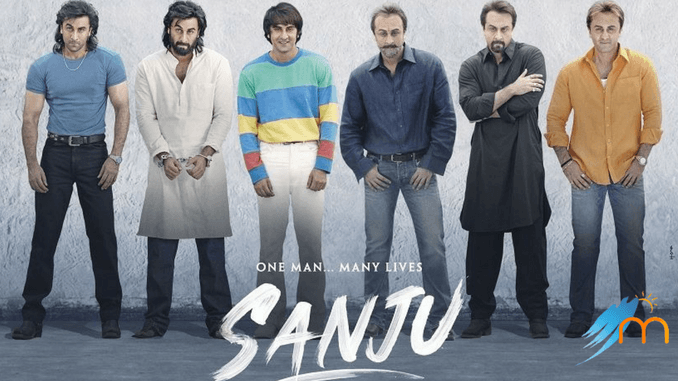
Sanjay Dutt is probably one of the larger-than-life figures in the Hindi cinema who is known more for his controversies surrounding him outside his reel life. Infamous for his apparent involvement in the 1993 Mumbai Blasts, and being accused of keeping an AK-56 rifle are the biggest squabbles of the 58-year old, it is no surprise that we are finally seeing a biopic. It didn’t come as a surprise with Rajkumar Hirani directing the film and Vidhu Vinod Chopra producing it, the duo have a long-standing relationship with Sanjay ever since he was casted in Munnabhai M.B.B.S in 2003.
Sanju, as he was affectionately called by fans and family alike, starts off with a pretty gripping and intense first-half. The 70s is almost coming to a close, and veteran Bollywood actor Sunil Dutt (played by Paresh Rawal), is shooting Rocky, to launch his son Sanjay (an outstanding performance by Ranbir Kapoor) in the industry. Sanjay, in his early twenties back then, could be labelled as the ‘Bad Boy’ of the industry, an image reminiscent in the media for a majority of his career. A high-functioning alcoholic, drug-addict, smoking pot, popping LSD, snorting cocaine, there was little to no hope that Sanjay could fill his father’s shoes as an actor. The first half of the film largely deals with his battle with drugs, both at a physical and psychological level. A brief stint of the movie also deal with the young actor with the untimely death of his mother, veteran actress Nargis (played by the starlet of the 90s, Manisha Koirala), who passed away days before the premiere of Rocky.
The film is adored and admired alike by the stellar performances by the cast, be it Ranbir Kapoor, who went through great lengths to replicate Sanjay through his various stages of his life, even as a prisoner in his fifties at the Yerwada Jail, producing an almost flawless performance. Manisha Koirala, who had stated in various interviews that she went to the extent of studying the essence of Nargis to bring it out on the screen, definitely kept her word, with those who had witnessed the acting prowess of the diva of the 1950s, felt somewhat the same as they did back then. But perhaps, the best performance was the on-screen chemistry between Paresh Rawal and Ranbir Kapoor as the father-son duo. The emotions portrayed by a helpless father who is cycling around the loops of diplomacy and polity to free his son from the shackles of prison. The lifelong struggle of a father trying to salvage his son for a normal life reaches its pinnacle when Sunil Dutt passed away in 2005, leaving Sanjay in bits. “You’re my hero, dad.” Is what Sanjay said, as he lit the funeral pyre of his father, making it impossible not to tear up in the emotionally charged moment.
However, it wouldn’t be fair to say that the film is all cake and melon. The second-half is rather disappointing and is constituted by elements surplus to requirements, so much so, that the film signs off with the fact that Dutt was framed by the jaws of media and the paparazzi, and has also posed some questionable remarks on the integrity of media. While it is understandable that Sanjay Dutt’s reputation was heavily paralysed by media trials, solely blaming media personnel is kind of outrageous. It makes you feel as if the whole film was an attempt to cleanse Sanjay Dutt’s image by employing the very method he criticised the media for. While you pay for a ticket to watch the entire film, the film loses its edge after the intermission which it has been building up so well, and you leave your seat with Sanjay Dutt’s bias, but touched by the tumultuous story of a father and son.

Be the first to comment